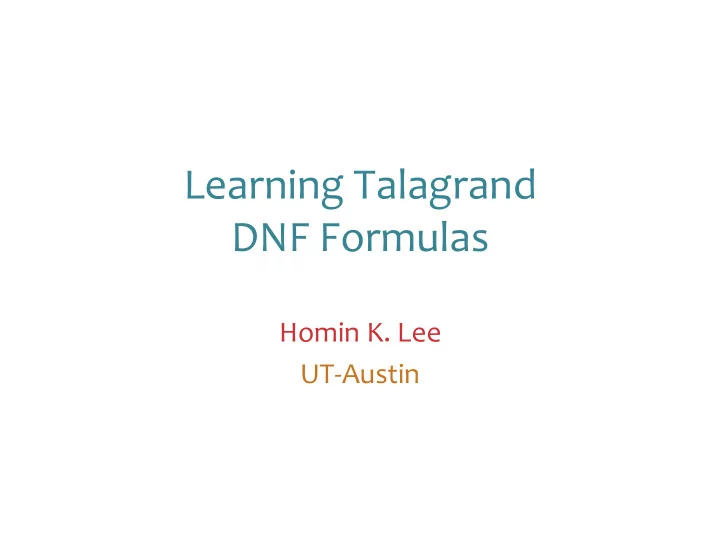

Learning Talagrand DNF Formulas Homin K. Lee UT‐Austin
DNF Formulas Disjunctive Normal Form: OR of AND of literals _ _ _ Can also write as: x 1 x 2 x 4 x 6 Ç x 1 x 2 x 5 Ç x 1 x 2 x 3 Size is the number of AND gates (terms).
PAC Learning DNF Formulas A is a PAC‐learner for poly(n)‐size DNF if 8 f in the class given uniform random examples (x,f(x)) w.h.p. outputs h s.t. Pr[ h(x) = f(x) ] ¸ 1 ‐ ε [V84] Best alg takes time n O(log n/ ε ) [V90]
Juntas Boolean funcs that depend on · k vars. [B03] Best alg takes time n 0.7k [MOS03] Learning DNF ) Learning O(log n) Juntas
Parity with Noise S = {x 1 ,x 5 ,x 8 ,x 9 } χ S (x) = 1 if odd # of vars in S are set to 1. χ S (x) ⊕ η , η = 1 w.p. p Best alg takes time 2 O(n/log n) [BKW00] Learning PWN, |S|=O(log n) ) Learning DNF [FGKP06]
Statistical Queries An SQ‐oracle given g, outputs a good estimate to E[g(x,f(x))] SQ‐learners for DNF take n ω (1) queries [K93] Almost all PAC‐learning algs are SQ algs!
Monotone DNF Monotone: no negations on the literals x 1 x 2 x 4 x 6 Ç x 1 x 2 x 5 Ç x 1 x 2 x 3 [V84]
No Excuses! Monotone juntas are easy. MDNF can’t compute parity. No SQ lower bounds. No consequences!
Known Results • Poly(n)‐size read‐k MDNF. [HM91] • Size‐2 √ log(n) MDNF [S01] • Random poly(n)‐size MDNF [S08,JLSW08] – Pick t terms uniformly from all terms of size log(t) – Relies on terms not overlapping too much Pretty pitiful.
Setting a Goal • Read‐o(1) • Size Ω (n) • Overlapping terms
Talagrand DNF Pick n terms from set of all terms of length log(n) defined over first log 2 (n) variables. [T96] • Size n, read‐o(1). • Know all relevant variables. • Lots of overlap.
Talagrand DNF Pick n terms from set of all terms of length log(n) defined over first log 2 (n) variables. [T96] • f is sensitive to low noise Pr[f(x) ≠ f(y)] = Ω (1) y=x with each bit flipped with prob 1/log(n) • f has high “surface area” Ω ( √ log(n))
Prizes • PAC‐learn Talagrand DNFs w.h.p. over the choice of DNF. • PAC‐learn Talagrand DNFs in the worst case. • Prove that Talagrand DNFs require n ω (1) SQ‐queries [FLS10].
Recommend
More recommend